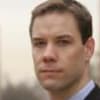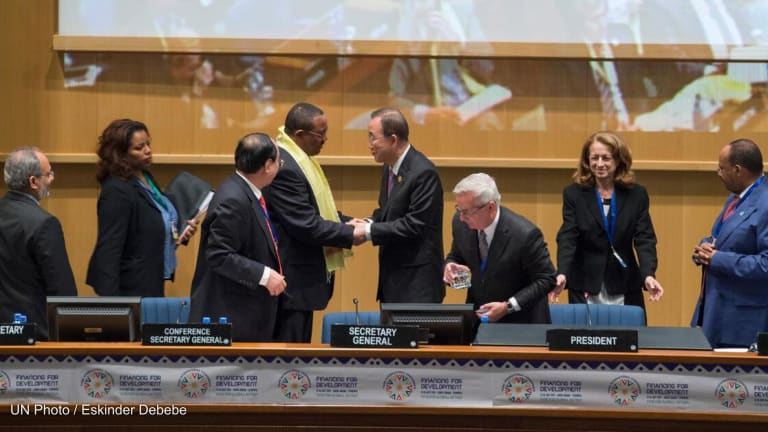
The World Economic Forum’s annual Davos conference marks one of the world’s more layered brands. For media leaders, it is an opportunity to take stock of sentiments among global business and policy elites. For business leaders, it offers a chance to broker deals and, in some cases, announce publicly-minded initiatives amidst an attentive audience. For politicians and policy leaders, it is a pre-G-20 moment to meet with international peers on priority topics for the year ahead, and also to meet with private-sector shapers of the global economic agenda. For nonprofit leaders and academics, it is a chance to interact with all of the above, and to access a rare concentration of people who affect an uncommon share of the world’s political, economic and public attention.
Last week, I attended Davos for the third time, and each time the experience has been quite distinct. In 2005, I attended as a staffer in my then-U.N. capacity, just weeks after the Asian tsunami and 10 days following the release of the U.N. Millennium Project’s final report, “Investing in Development.” Poverty and the Millennium Development Goals were at the top of everyone’s agenda, including politicians like then-Chancellor of Germany Gerhard Schröder and celebrity attendees such as Bono, Angelina Jolie, Richard Gere, Sharon Stone and Chris Tucker.
I returned to Davos five years later, in 2010, as CEO of Millennium Promise, a non-governmental organization focused on the MDGs. The meeting atmosphere was reserved as the world emerged from the shocks of the global economic crisis. By then, I was invited to participate as a member of a group the forum has been generous enough to designate as Young Global Leaders, an initiative that brings together publicly-minded people from business, government, academia and nonprofit sectors to learn from each other through regular collaborations over a five-year period. For nonprofit representatives like myself, the forum waives its conference fees and encourages us to make the most of the opportunities to connect, brainstorm, and problem-solve with representatives from all sectors around the globe.
In the lead-up to last year’s Davos events, I worked with Johann Koss, Olympic champion and CEO of the NGO Right to Play, and dozens of other members of the YGL community to launch a new initiative through which private individuals and organizations could make their own targeted, time-bound and measurable pledges to support the achievement of the MDGs. Economists like Esther Duflo and Kristin Forbes of the Massachusetts Institute of Technology joined with Michael Kremer of Harvard to make an MDG deworming pledge. Zainab Salbi of Women for Women made an MDG pledge, as did Sheryl Sandberg of Facebook and many other leaders in their respective fields. The forum’s YGL initiative made this entire effort possible, and all of the pledges are publicly registered on www.mdgpledges.org, which also now partners with the U.N. Foundation.
Davos in 2011
Last week’s World Economic Forum brought many memorable moments. The press reports generally focused on the cautious optimism of the politicians and the regulatory concerns of the business leaders. But there are so many parallel conversation streams within Davos that everyone forms their own narrative.
For me, a highlight in the formal program came when Bill Clinton described the MDGs as a non-optional part of the long-term U.S. economic strategy. Another was to watch U.K. Prime Minister David Cameron’s political mastery as he conducted a roving Q&A with a plenary room as if it were a local town hall. Many reported the playing of Aung San Suu Kyi’s taped message as a high point, although unfortunately I wasn’t there to see it in the moment.
On the sidelines of the meeting, it was invigorating to see the modernizing social network influences on this remote Swiss conference center, as Twitter feeds streamed everywhere and Facebook’s Randi Zuckerberg webcast a constant stream of live interviews with personalities ranging from Nicholas Kristof of the New York Times to Kumi Naidoo of Greenpeace and former U.S. Treasury Secretary Larry Summers. Meanwhile, YGL friends were very pleased to present the first annual report on MDG Pledges, and to launch a new website that makes it possible for any organization or individual to register their own MDG pledge.
Amidst the ebb and flow of events, Davos is a rare moment to connect a rapid succession of informal meetings with leaders from the public, private and nonprofit sectors. My own schedule included a breakfast with Rwandan President Paul Kagame, former U.K. Prime Minister Tony Blair, Harvard business icon Michael Porter and major CEOs discussing new foreign investment opportunities in Rwanda. There was the conversation on expanding agricultural credit facilities with a senior African policymaker; then the technology brainstorm with a Silicon Valley leader around a global graduate degree program I help coordinate; then a discussion with an eminent philanthropist on how new technology can foster more collaborative problem-solving between the world’s richest and poorest communities; followed by a strategy session with one of Mozambique’s leading civil society voices on how to empower citizens’ debates around the MDGs.
Each of these conversations was inspiring in its own way. Together, they afford a patchwork view of how various global conversations could better thread together through concerted efforts.
There is a broad understanding that many people of influence and wealth gather in Davos every year to discuss topics of mutual interest. This is fair enough in a free associating society where private companies pay membership dues to attend a major meeting and keep the trains running. At the same time, there should be greater understanding that large numbers of people with enormous goodwill and much-deserved moral influence convene in Davos every year to identify new ways to collaborate and discuss topics of global public concern. With access comes responsibility to speak on behalf of those without.
Perhaps contrary to popular imagination, Davos convenes large numbers of people who live that responsibility every day. I know because I had the privilege to meet many of them last week.
What’s your take on the World Economic Forum? How did you experience this year’s gathering in Davos? Please share your thoughts by posting a comment below!



